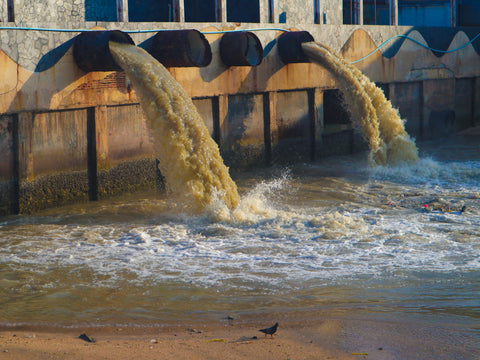
Drinking water can become contaminated by industrial water pollution. While the problem is not as severe now as it once was, it’s still a concern for many locales within the US.
The following are some of the more common contaminants found in water once it has become polluted by industrial waste or discharge.
Consumers should understand that long-term exposure to excessive amounts of these chemicals can have a variety of health problems including cancer, anemia, liver and kidney problems, to name just a few.
Asbestos
Drinking water that contains excessive levels of asbestos can increase the risk for benign intestinal polyps.
Benzene
The chemical benzene leaches into water from factory runoff, gasoline storage tanks, and landfills. Benzene has been linked to anemia, decrease in blood platelets, as well to increased risk of cancer.
Carbon Tetrachloride
Carbon tetrachloride can pollute water as it is discharged from chemical plants and other types of industries. Drinking water that has excessive amounts of carbon tetrachloride can cause liver problems.
Ethylbenzene
Ethylbenzene is usually discharged from petroleum plants. Excessive exposure to ethylbenzene can cause kidney or liver problems.
Monochlorobenzene
Monochlorobenzene is found in dyes and insecticides. It is also known to be used as a solvent. Drinking water that is contaminated with high levels of monochlorobenzene can cause kidney, liver, and central nervous system damage.
MTBE
MTBE is used to increase the oxygen level or content of fuel. MTBE can pollute water supplies when it leaks from storage tanks, pipelines, accidental spills, and marine engine emissions.
o-Dichlorobenzene
o-Dichlorobenzene may be discharged from chemical factories. Exposure to excessive levels in drinking water can cause liver, kidney or circulatory system problems.
Tetrachloroethene
Tetrachloroethene is used primarily in dry-cleaning processes. It usually gets into the water supplies through emissions. Drinking water that is contaminated with high levels of this substance can cause kidney, liver, and central nervous system damage.
Toluene
Toluene is most often discharged from petroleum factories. Drinking water that contains excessive levels of this chemical can cause a variety of health problems including liver, kidney or nervous system problems.
VOCs
VOCs, which are also known as Volatile Organic Chemicals, are actually a group of chemicals that are often used as solvents in many industrial and household products. VOCs enter the groundwater when they are improperly discarded. There are many health issues associated with drinking water containing excess VOC levels. These vary from nausea, headache, confusion, liver damage, and impaired speech.
Using a high-quality water filter can help remove these industrial pollutants from your drinking water and help protect you and your family from harm.

